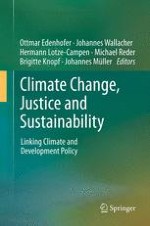2012 | OriginalPaper | Buchkapitel
12. The 2°C Target Reconsidered
verfasst von : Brigitte Knopf, Martin Kowarsch, Christian Flachsland, Ottmar Edenhofer
Erschienen in: Climate Change, Justice and Sustainability
Verlag: Springer Netherlands
Aktivieren Sie unsere intelligente Suche, um passende Fachinhalte oder Patente zu finden.
Wählen Sie Textabschnitte aus um mit Künstlicher Intelligenz passenden Patente zu finden. powered by
Markieren Sie Textabschnitte, um KI-gestützt weitere passende Inhalte zu finden. powered by
